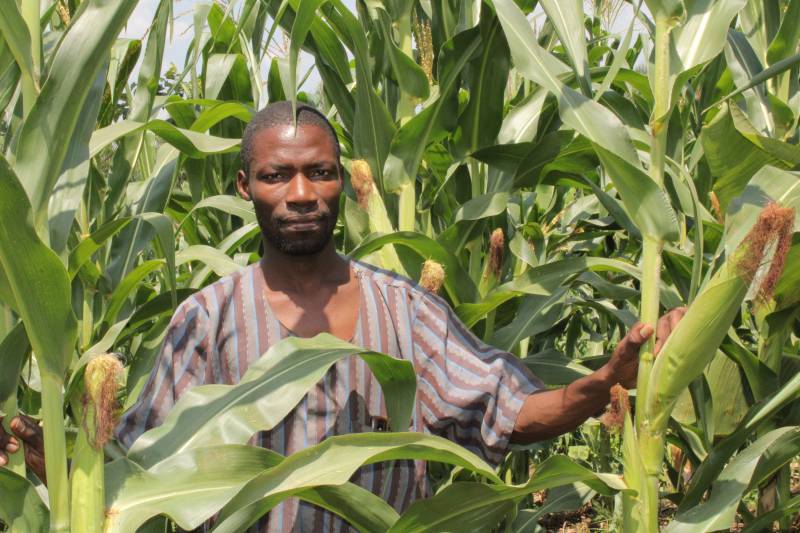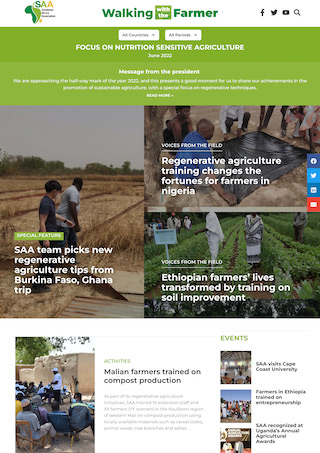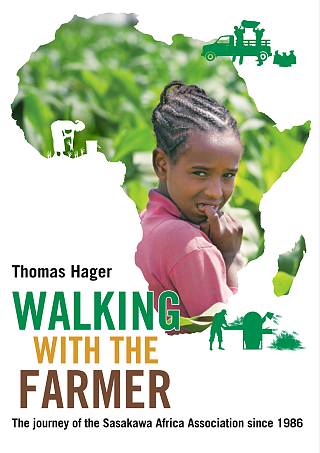Transforming Lives Through Sustainable Agriculture: Sserwada’s Journey with SAA

Transformative Power of Sustainable Agriculture Practices
In Kibanga Village, Bukomero Subcounty, Kiboga District, Sserwada Saidi, a 46-year-old father of 13, epitomizes the transformative power of sustainable agricultural practices. For years, Sserwada's relied on traditional and rudimentary farming methods to feed his large family. He used conventional farming techniques such as intense plowing, recycling grain as seed, monocropping and increased pesticides use, without concern for the impact on soil fertility, soil depletion, compaction, low yields and rising input costs.
Biginning of the Agricultural Journey with SAA
The pivotal change in Sserwada’s agricultural journey began in 2020 when his late wife learned about the Sasakawa Africa Association (SAA) interventions in their subcounty. Encouraged by her, Sserwada decided to participate in SAA training programs, marking the start of a remarkable transformation. Through these programs, he gained comprehensive knowledge of good agronomic practices, including Regenerative Agriculture (RA). He learned essential practices such as the use of certified seeds, correct spacing for maize and beans, effective pest and disease management, soil health maintenance, livestock-crop integration, and efficient land preparation. Additionally, he was trained on minimum tillage, cover cropping, crop rotation, mulching, the use of organic manure, and post-harvest handling and management skills.
Outstanding Difference Between Regenerative Agriculture (RA) Practice and Conventional Practice
In 2021 Sserwada established two half-acre demonstration plots to compare the effectiveness of Regenerative Agriculture (RA) practices against conventional farming methods. In the RA plot, he implemented minimum tillage, used a combination of organic manure and inorganic fertilizers, planted in lines, and utilized quality seeds. In contrast, his conventional practices included recycling of seeds, and planting without fertilizers. The results were striking: the plants in the RA plot were healthier, grew larger, and were easier to weed and harvest. Remarkably, the RA plot yielded 30% more compared to the conventional methods, and cost was 40% less due to optimal use of organic and inorganic fertilizer and agro-chemicals.
"The Difference Is like Night and Day"
Following the implementation of Regenerative Agricultural (RA) practices, his efforts culminated in a harvest of 4,000 kg of maize in the second season of 2023 from two acres, significantly increasing his income. Sserwada shared that his production costs decreased by 30-40% while his crop yields increased substantially. "The difference is like night and day," Serwada explains. "Before SAA, I struggled to get by. Now, I can support my family better, invest in my farm, and even help my community."
Becoming a Model Farmer to Inspire Many Smallholder Farmers
Recognizing his potential, SAA selected him as a Community-Based Facilitator (CBF), empowering him to teach others in his village about RA practices. As a respected resource person in Kibanga, he inspires many smallholder farmers with his success as a model farmer. Recently appointed as the Local Council chairperson of his village, he now shares his knowledge and information on RA practices with all local farmers, including those not involved in SAA programs.
Tools and Confidence to Dream Big
Sserwada's future plans are ambitious. He is currently planning to integrate more RA practices on his farm to sustainably increase on his yields in the coming seasons. He aims to acquire more land, and expand his livestock to enhance his farm’s productivity. His journey from subsistence farming to becoming a community leader and successful farmer illustrates the profound impact that sustainable agricultural practices can have. "One day, I want to expand my farm to 15 acres and provide even more for my family and community," Serwada envisions. "The support from SAA has given me the tools and confidence to dream big."
 Sserwadda standing at the 7 bedroom house which he is constructing
Sserwadda standing at the 7 bedroom house which he is constructingThe Profound Impact of SAA's Interventions
Serwada’s remarkable transformation from a traditional subsistence farmer to a prosperous, community-leading advocate for sustainable agriculture showcases the profound impact of SAA’s interventions. As we continue our work, we are committed to replicating this success across other communities, driving sustainable agricultural development and improving lives.
Retrieved from SAA E-Newsletter, issued in June 2024, titled "Focus on Uganda"
SAA Publications

E-newsletter
"Walking with the Farmer"
SAA publishes a bimonthly e-newsletter reporting on SAA activities.

SAA history book
"Walking with the Farmer: The journey of the Sasakawa Africa Assoication since 1986"
This book chronicles the history of SAA from its inception to the present.

Annual Report
Annual Report FY2023
Annual Report FY2023 is available here.





